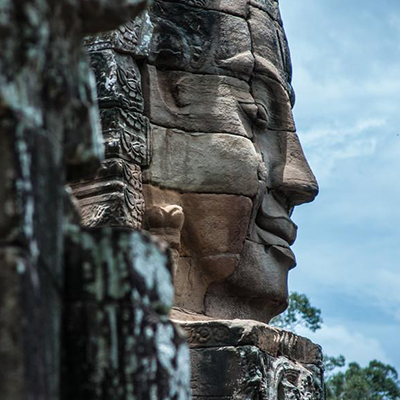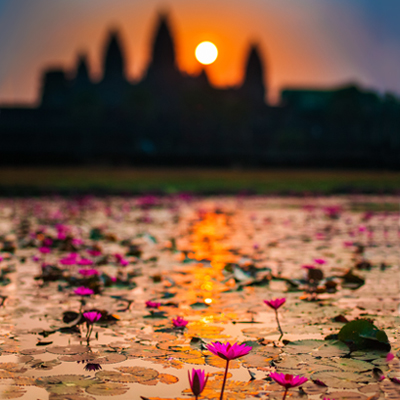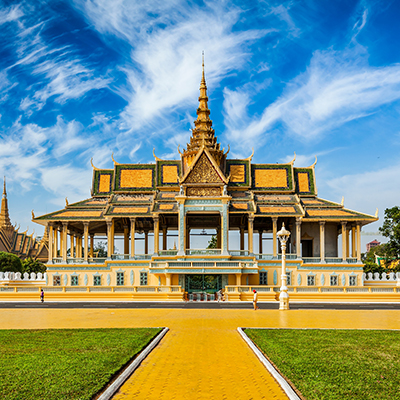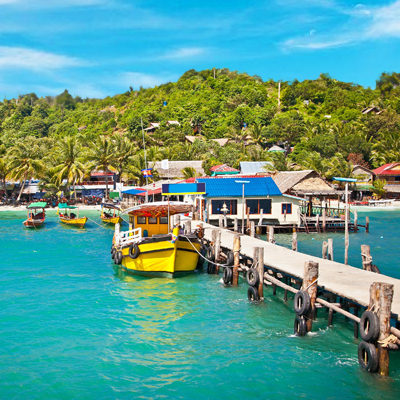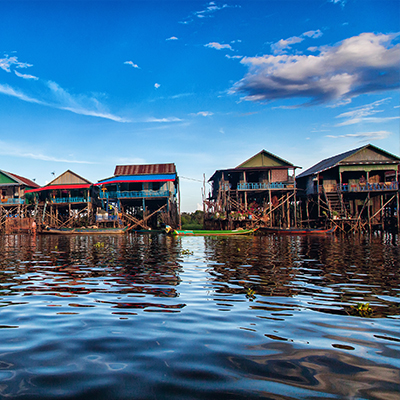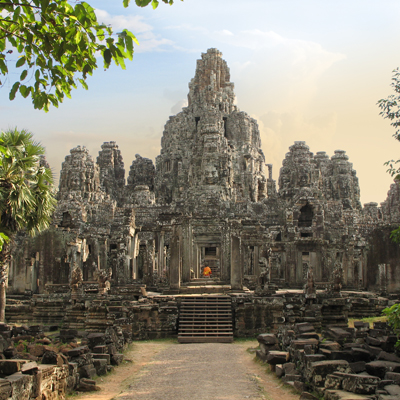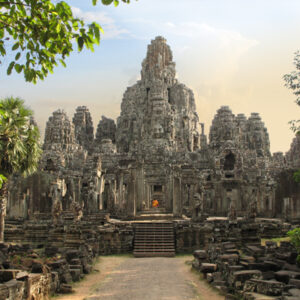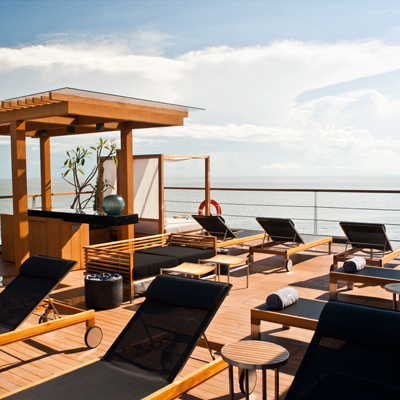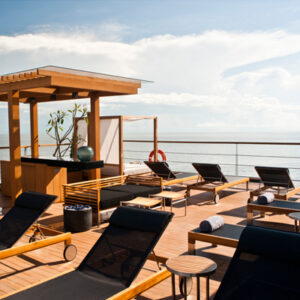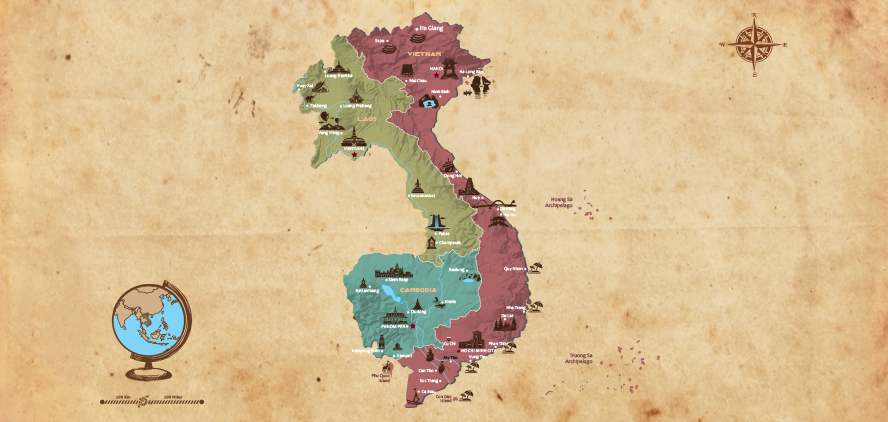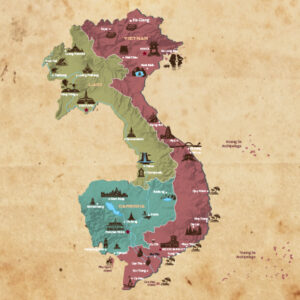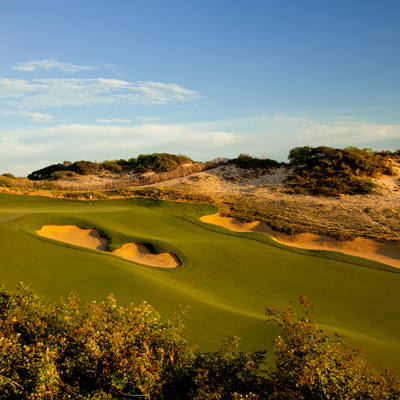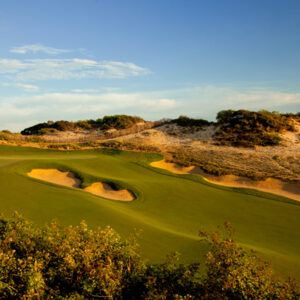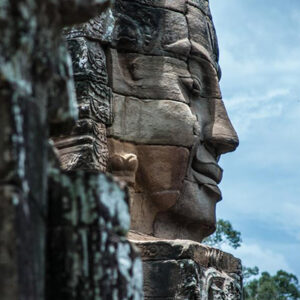CAMBODIA - THE KINGDOM OF WONDERS
Travelling through Indochina isn’t complete without taking a stroll through the awe-inspiring Angkor Wat. Cambodia’s former irrigated imperial ruins are the largest collective religious site in the world and has embedded itself in the world’s consciousness as one of the most attractive destinations in Asia. This brilliant ancient civilization is framed by a tragic recent history which makes one wonder about a people’s continuity.
Cambodia’s streets, at times filled with elegant tuk-tuk’s and other times filled with throngs of orange-clad monks has a distinct flavor to its landscape. The orange monk’s robes parallel the orange tropical landscape that surround the famed Angkoran structures. As Cambodia has made its appearance slowly into the global market, there are still mysteries unraveling in the deep green jungles. Temples still being discovered by undergrowth and the truths of the peoples of the ancient past are converging with the archaeologists of today.
Cambodia asks us to see some of the greatest things we humans can achieve and yet also asks us to contemplate the most terrible things a human can do. This discrepancy, or maybe even balance, allows us to looking into our own humanity. Modern Cambodia though, is not so serious, and therein lies the true beauty of the country. Its brilliant and dark past recede into the sands of time like the heavenly waves crashing on the southern shores unfolding a breathtaking resort hotspot for all to enjoy.
EXPLORE OUR CAMBODIA
Cambodia is a land of stark contrasts, it hosts the largest religious site in the world dating all the way back to the 9th century and is the site of one of the most recent genocides of the 20th century. Not only does Cambodia have some of the most pristine crystal clear beaches along the Gulf of Thailand but it also houses the largest lake in all of Southeast Asia. These contrasts in scale and scenery are as breathtaking as they are mesmerizing, come with us and take a quick look through what this beautiful country has to offer.
ESSENTIAL INFORMATION FOR TRAVELLING TO CAMBODIA
International flights to Cambodia are operating mainly to Siem Reap and Phnom Penh International Airports. To name a few are AirAsia, All Nippon Airways, Bangkok Airways, China Southern Airlines, Emirates, Korean Airs, Laos Airlines, Malaysia Airlines, Qatar Airways and Vietnam Airlines.
Domestically, there are Cambodia Angkor Air with the national flag carrier, Bassaka Air, Cambodia Airways, Cambodia Bayon Airlines and several more.
Airport tax, whether inclusive or exclusive in the airfare of international flights must be checked when buying tickets.
ATMs are popping up all over the country in the main cities.
Credit cards are becoming more widely acceptable in Cambodia especially in the main cities.
Travellers’ Cheques are exchangeable in a few banks in the main cities of Phnom Penh, Siem Reap, Sihanoukville, Battambang and Kompong Cham.
The electricity is 220V – 50Hz and most plugs are two-pinned round or flat.
Bringing a universal travel adaptor with you is always recommended.
Chaul Chnam Chen between late January to mid/late February as per Chinese and Vietnamese New Year
Chaul Chnam in mid-April, this is the 3-day Khmer New Year celebrations involving a lot of water
Chat Preah Nengkal in early May, this is the Royal Ploughing Ceremony, in Phnom Penh only
Visakha Puja on the 8th day of the 4th month, i.e. mid-May to mid-June, this is Buddha’s birthday
P’chum Ben between mid-September to mid-October, this is a ceremony paying respect to the dead
Bon Om Tuk in early November, this is the festival when the current into Tonle Sap reverses and the water in Tonle Sap starts flowing back into the Mekong River again, one of the most important Khmer festivals
No vaccination is required except for yellow fever in case visitors are from affected areas. Visitors are advised to be inoculated against Typhoid, Cholera, Hepatitis A & B, Tetanus and Polio but this is not compulsory.
Malaria is not a problem in cities but care must be taken in rural areas. Please consult with a tropical medicine doctor before travelling.
Offices are usually open from Monday to Friday from 08:00 until 17:00 and often close for lunch between 12:00 and 14:00.
Shops are open subjectively and close any time before 23:00. Banker is however close at 15:00.
The internet is available in most of the bigger towns and cities.
Cambodia is GMT+7 and does not operate daylight saving system.
The Cambodian currency is called the Riel.
The USD is also widely accepted as is the Thai Baht in the West of country. Bring USD notes as these are good to change and also can be used to buy items. As a general rule you can buy most items in USD but expect to receive change in Riel.
In the more remote areas of the country only Riel is recognized as the legal tender.
January 1st International New Year Day
January 7th Victory over Genocide
March 8th International Woman’s Day
April 13th -15th Khmer New Year Day
May 1st International Labour Day
May 13th-15th King’s Birthday
September 19th-21st Pchum Ben’s day
September 24th Constitution Day
October 23rd Paris Peace Accord
November 9th Independence Day
December 10th International Human Rights Day
Buddhism is the dominant religion in Cambodia with up to 95% of the population being Buddhist.
Islamism is practiced by a small percentage of the population, mainly the Cham people residing near the Vietnam border.
Christianity and Hinduism are the religions of less than 1% of the Cambodian people.
Cambodia is a relatively safe country as the vast majority of the Khmers are devout Buddhists and pacifists. However there are the annoying pick pockets.
Violent crimes against foreigners are rare.
As Cambodia still has a large amount of unexploded ordinance (shells, land mines etc) please remember to stick to the marked paths.
Cambodia is renowned for its sculptures, wood carvings, silver and other precious stones.
Cambodia dialing code is +855
The larger up market hotels will levy a 10% service charge on your bill.
It is not compulsory but welcomed especially by the driver, tour guide and service staff.
A small donation when visiting temple, pagoda or church is a polite gesture.
Apart from citizens of several ASEAN member countries everyone needs a valid visa to enter the country. Visa can be granted upon arrival or online via homepages of the Cambodian Ministry of Foreign Affairs.
It is not advisable to drink tap water. Bottled water is safe and available everywhere at an easy cost. Hotels usually provide a complimentary bottle of water per person in the room.
Ice cubes are generally accepted but it is best to avoid having it on street stalls or in remote country areas. Some minor stomach problems are possible when travelling in exotic countries thus it’s smart to bring a supply of your usual anti-diarrhea medicine.
The lowlands are tropical and the highlands more temperate.
Its weather is similar to Vietnam. November to March are the best times to visit, April-May extremely hot and humid and June to October generally wet.
As such please remember to drink plenty of water.
CAMBODIA TOURS
Classic highlight experiences, rewarding culinary strolls, authentic heritage retreats and picturesque outdoor adventures are among the many rewarding encounters Cambodia has to offer.
